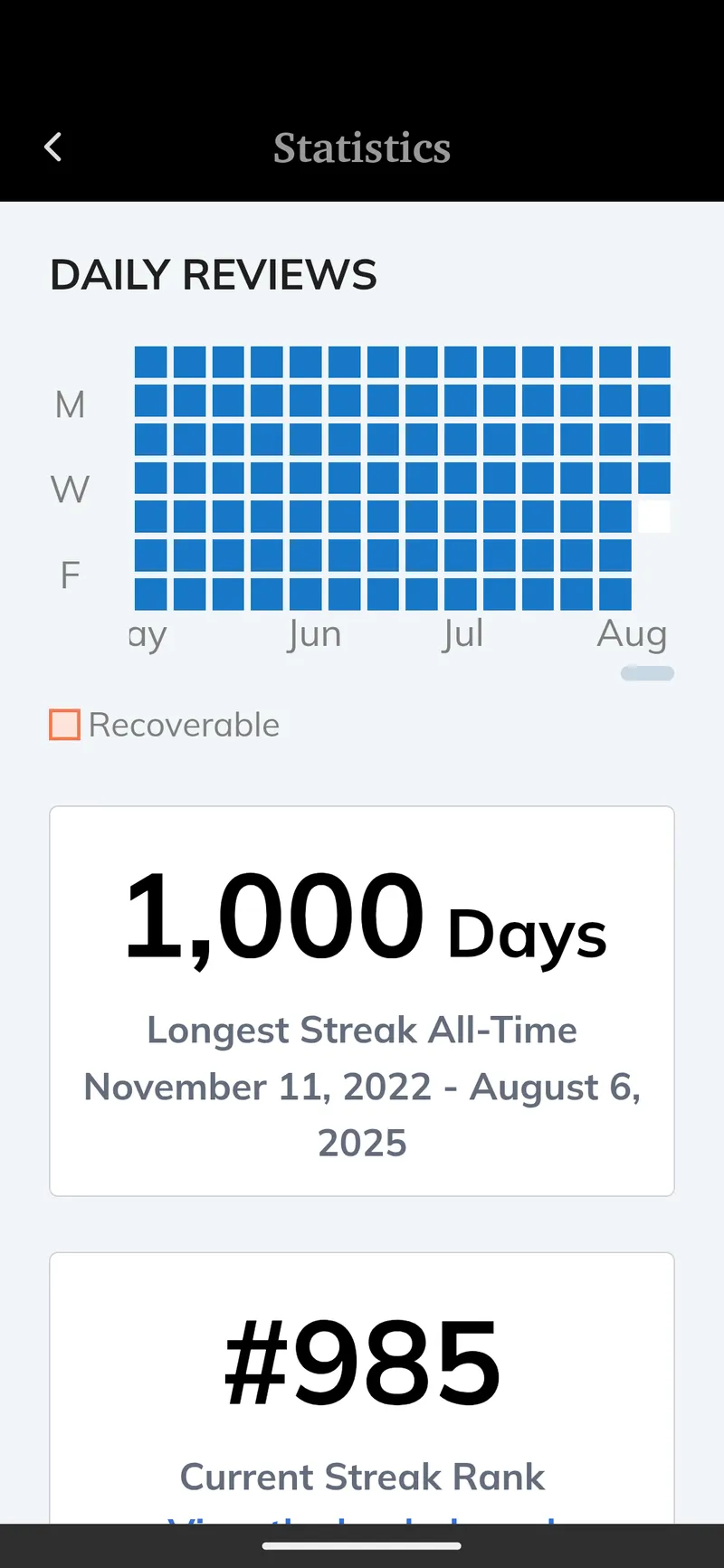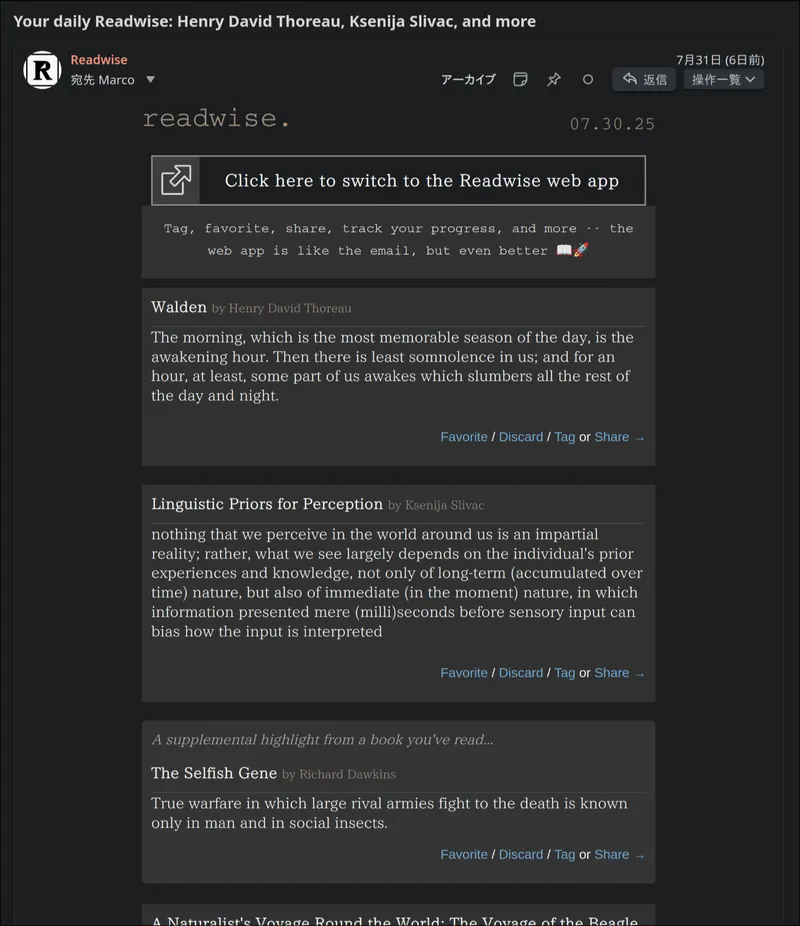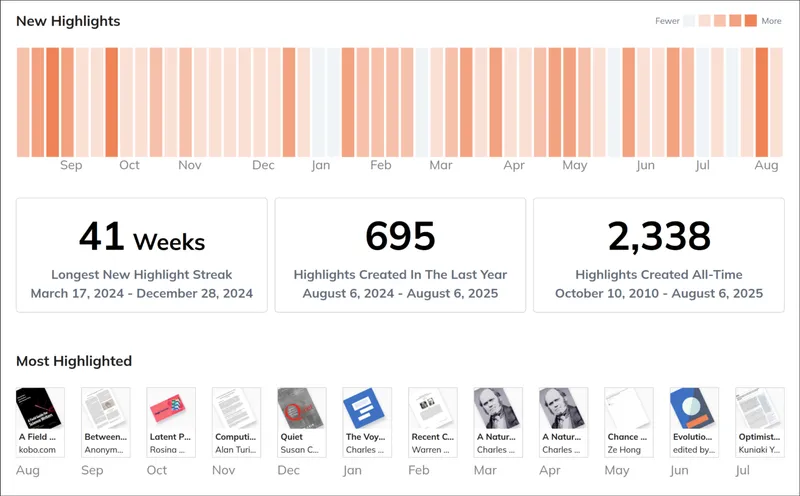Do You Remember What You Read?
Why I never skip a Readwise day
Marco Giancotti,

Marco Giancotti,
Cover image:
Photo of the Akita International University Library by Marco Giancotti
You read a book and love it, you highlight several of its most brilliant passages, and you feel that this process has changed you in some way. Maybe it has even changed your life a little bit. Then you move on to other books, the weeks pass, the months flow, and one day you realize that you remember little of that magnificent book. You recall that you loved it, and some of its key themes and propositions. If it was a novel, you might remember the rough outline and what happened in a few key scenes, but everything else is blurry, faded, or completely gone. You begin to question whether the book really changed your life as you so heartily felt at the time—whether it left you anything of value other than a warm, fuzzy feeling. But you have other good books to work through now, and even that doubt is soon buried in oblivion. And so you keep going, and the same thing happens again and again.
Until you die.
Just kidding, you're not really going to die. Sooner or later I am, though, and this is a real situation I experienced firsthand for decades. I don't know how many people will relate to this sense of having most of what you read slip through your fingers, but it was the norm for me for most of my life. Perhaps it is something only people with SDAM experience, and everyone else has no such problems. I hope to hear feedback either way (if you register for the newsletter here you can shoot me an email).
I've always been a slow but constant reader, and although I do think all those books changed me somewhat and helped me grow, I never really realized how much I was missing until about—nay, exactly—1,000 days ago.
I can sketch a rough outline of most novels I've read, list two or three traits of the main character or the key takeaways of a nonfiction book, but it's all 10,000-foot information. The sense I get is that what I can consciously remember constitutes the tip of an iceberg, the majority of which is locked away in forgotten recesses of my memory. Reading, for me, is mostly unconscious osmosis—its information dissolved in order to be absorbed—and remains largely outside my control to summon at will.
Then 1,000 days ago happened: November 11, 2022. The exact date is not especially meaningful, but I remember it because I have an accurate day counter shown to me every morning. Today, the counter says this:

(Before going any further: I will be praising Readwise a lot below, but I'm not sponsored by them, nor was I asked to write a review or anything. I just genuinely think it's a great service, and more people should know about it. That said, there is a referral program, and if you're thinking of registering for Readwise you can do me a favor by using this referral link.)
The screenshot above is from Readwise, the app and paid service that changed how I relate to my past reading. The way it works is very simple: you link it with your Kindle account, your Kobo account, and/or a ton of other sources you might be using for reading stuff, and every day they send you ten passages you highlighted in the past for you to review.
The passages are selected semi-randomly, with some criteria to make the list more meaningful and varied. You re-read them one at a time and can immediately swipe left to move on to the next highlight, or provide feedback about that specific item: for example, you can add a comment to it, or you can exclude it from all future reviews (useful when you mis-highlighted something, or when it has become irrelevant or undesired). You can also control how often or rarely—if at all—a given book or source should be selected in your reviews. I won't cover all functions, but suffice it to say that it gives you all the configuration handles you need to tailor your reviews exactly how you need them.

I registered for Readwise on November 11, 2022, and have never skipped a single review since. One thousand days is both my longest and my shortest streak on the platform. This is not just an opportunity to brag (although that's exactly what I'm doing, I guess; hey, just this once). I share it here because I think this little milestone proves how much it has become an integral part of my life. I think it complements my memory in a fantastic way that I never anticipated: I remember the high-level stuff okay-ish, and Readwise reminds me of the fine-grained stuff, the sentence-level insights that hit me the hardest at first reading. It opens up avenues of thought that I had thought forever outside my reach.
This is what I think Readwise does to my brain: it reawakens that submerged iceberg-portion of what I absorbed from my reading. Where I have no reliable handles to recall detailed segments of a text, Readwise stimulates it back into consciousness. This doesn't guarantee that I'll be able to remember it forever—the uncovered insights usually bury themselves back soon enough—but it does allow me to make new connections on the spot, and this is what I find exceedingly useful.
Because what is reading useful for, if not to make new links in the network of your thoughts and feelings?
My rather un-scientific hunch is that this kind of randomized daily review reactivates neural networks that would otherwise remain dormant most of the time, and allows them to "talk to each other". These are the sources I reviewed today, on my one-thousandth review:
- Charles Darwin's The Voyage of the Beagle
- Kazuo Ishiguro's The Buried Giant
- Richard O. Prum's The Evolution of Beauty
- James C. Scott's Seeing Like a State
- Yasutaka Tsutsui's 創作の極意と掟
- A neuroscience paper by Megla et al (2025) about aphantasia
- A psychology paper by Hong (2025) about how people tend to explain natural phenomena
- Cormac McCarthy's Suttree
(Fewer than 10 because the review included multiple quotes from some of these sources.)

You'd be surprised how many connections can occur to you among such an eclectic crew of quotes. And new connections arise even, or especially, with ideas outside the review itself. On any given month, I'm reading several books and thinking hard about a small number of topics, so the 300 old highlights resurfaced for me in 30 days provide plenty of opportunities to hook up my ideas-of-the-day with insights that I had half-forgotten.
But my favorite benefit from using Readwise is that it integrates well with Obsidian, a popular networked note-taking tool. I use Obsidian heavily every day to record and link up every thought I have, enormously expanding the breadth of my thinking. Readwise can be configured to automatically add all new highlights to my Obsidian vault, so that they're ready to be connected, in a couple of keystrokes, with the thousands of other ideas in there. The net effect is that these two products allow me to build ideas on top of each other like never before. What originally felt like a house of cards, where I could only piece together two or three insights at a time, can now grow indefinitely in every direction, with any number of different decks of cards. If Obsidian is my "second brain," Readwise is a "meaning antenna" directly injecting good thoughts by others into it. Some weird metaphors are in the air today, folks.
Something that happens quite often is that I stop in the middle of a daily review and say to myself, "Dang, I've read this highlight about 'A' many times before, but now I finally see that it relates deeply to that topic, 'Q,' I was working on yesterday!" Then I rush over to Obsidian, find the auto-synced version of the same highlight on A, and add a link or two with the notes about Q. From that day on, I will be able to trace the connection from A to Q in either direction by simply looking at my notes. I can't overstate how good all this feels.
Readwise is not free. You have to pay $5.59 every month for it, and that might not be for everyone. But the kind of value that it brings, for me, is many times that amount. At the risk of sounding hyperbolic, it feels like the good people at Readwise invented an upgrade to the old process of reading, after millennia of stagnation. Why isn't everyone talking about it? Why isn't it mandated by every school on Earth? It has got to be the most underrated service out there.
At least, that's how I feel about it. For people with poor detailed memory like me, it is a boon. But I suspect it will be useful to you even if you have decent memory, as long as you read a lot and like to think about what you read. ●
(Here's that referral link again. You know. Just in case.)
Cover image:
Photo of the Akita International University Library by Marco Giancotti
